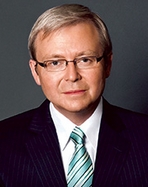
The Honorable Kevin Rudd was the 26th Prime Minister of Australia, now serving as President of the Asia Society Policy Institute and Senior Fellow at the Harvard Kennedy School. You may follow him on Twitter @MrKRudd
PRESIDENT Xi Jinping’s visit to the United States in September 2015 was more important than your average Chinese state visit. There are two reasons for this. Prior to the visit, there was a real danger that the U.S.-China relationship, based on a mounting list of American and Chinese concerns, ranging from the South China Sea to cyber security, might begin to spiral out of control. The fact that it did not is a tribute to the two leaders, both of whom sought to identify new areas of strategic cooperation—for example in climate change—while recognizing the real and significant disagreements that remained between them.
But there is also a second reason for the visit’s significance. This relates to the content of Xi address to the UN General Assembly following the Washington summit. Xi’s speech caught much of the international community by surprise. It is the closest that Xi has come to a doctrinal statement on China’s attitude toward the future of the global order. After several years of wide-ranging, and at times wild, debate in the Chinese official and semi-official media on the need for change in the international system, Xi provided a definitive re-affirmation of the present UN-based multilateral system. He stated: “China was the first country to put its signature on the UN Charter. China will continue to uphold the international order and system underpinned by the purposes and principles of the UN Charter.”
This statement, which echoed a similar one made by Jiang Zemin in 1995, represents a decisive shift away from the position of the pre-1949 nationalist government which considered that because Communist China had had nothing to do with the framing of the post-war international settlement—as was the case with many developing countries that were still Western colonies in 1945—the resulting order was in need of deep reform in response to the new voices from, and the legitimate aspirations of, the “global south.”
Xi in fact went further in his speech by outlining a range of new contributions that China would now make to sustain the current order into the future. This included China’s first aid contributions to be delivered through UN multilateral development agencies, rather than exclusively bilateral programs. Xi also announced China’s first contribution to the new UN Peacekeeping Capability Readiness System, including a permanent police squad and 8,000 Chinese troops dedicated to a peacekeeping standby force.
Ten years after America’s then Deputy Secretary of State Robert Zoellick’s controversial address on the need for China to become a “responsible global stakeholder,” China will privately point to Xi’s statement as concrete evidence of such a commitment—both in doctrinal and practical terms. China will also point to its new approach on climate change as evidence of the same. China will say, too, that it is assuming these responsibilities despite still being a developing country.
Americans, in the main, will not be persuaded by this, arguing instead that China’s policies—in the South China Sea, in outer space, in cyberspace, and in the broader expansion of its military and naval capabilities—do not represent the actions of a “status quo” power. Americans will also point to what they see as the geopolitical leverage that China is now seeking to exact globally from its trade and investment in countries across the world, as well as its long-standing, large-scale bilateral development programs across Africa and Asia.
More fundamentally, these conflicting American and Chinese perspectives point to a much broader debate in the international community—and not just in the Asia-Pacific—on the impact of the trajectory of U.S.-China relations on the future of the global rules-based order.







